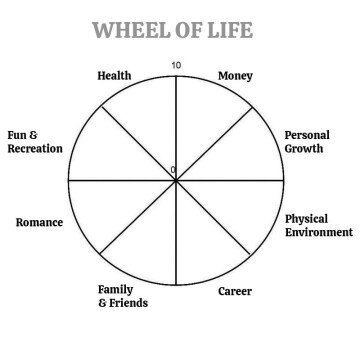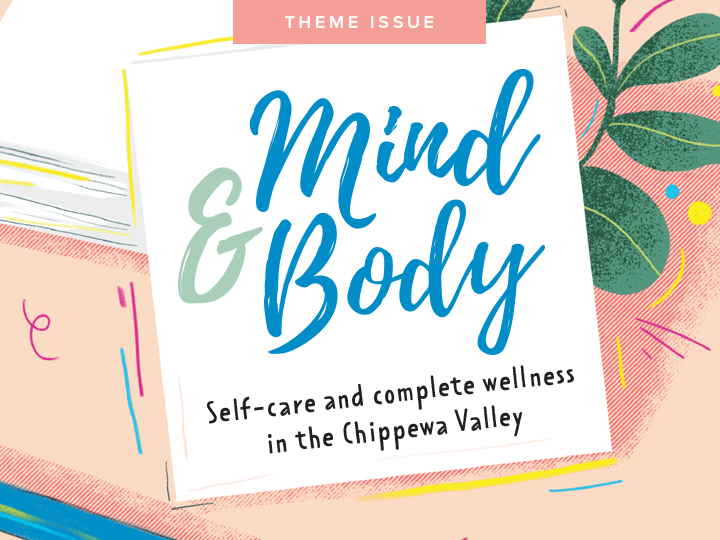Eight Areas to Remember When Creating a Self-Care Regimen
finding balance means focusing on core aspects of life
Barbara Arnold, photos by Andrea Paulseth

“You have more self-help books, attend more self-care workshops, and join more self-esteem groups than anyone I know, and you are someone who needs it least,” commented a former Chicago boyfriend. Yes, I admit I am a self-care, self-esteem, and self-help junkie. No apologies. Life’s a journey for sure. Each book, workshop, and group has helped me learn more about myself.
When I downshifted my brilliant career in the big city to return to my hometown of Eau Claire for eldercare, I sought help when the oxygen mask maxim just wasn’t enough anymore. For those who have flown, the oxygen mask rule of self-care shared by flight attendants goes like this: “Should an emergency situation occur, you need to put on your own oxygen mask first, before attempting to help those around you.” If you don’t put on your own mask first, you’ll run out of oxygen and won’t be able to help anyone else.

So when it comes to self-care, putting yourself first is a priority and an unselfish act. I reached out to local life coach Jane Norby of True Compass Life Coaching for help, and she introduced me to the Wheel of Life, also called the life balance wheel. The Wheel of Life provides a gap analysis of sorts to take stock of your life, where you are, where you want to be, and what you want or need to do to close the gap. It’s best to do with a certified coach like Jane to serve as an accountability partner and help you consider possibilities.
Health: Your health – physical, emotional, mental, and spiritual — always comes first. The old adage you’re nothing without your health rings true. Physical involves food (what and how much you eat), exercise (something you enjoy), and sleep (which can be vastly underrated). Emotional and mental health is at the forefront nowadays, particularly after COVID. Feel free to seek out a professional, such as a nutritionist, a trainer, or a therapist. Spiritual health can take many forms — from Unity’s Daily Word booklet to belonging to a religious community. Self-care rituals can be critical, such as a monthly spa day, a weekly spa hour or two – a facial, and a mani/pedi, or even a professional massage. You are in charge of your health. Always do your research on whatever drug might be prescribed to you as sometimes the “cure” and its side effects can be worse than what ails you.
Money: Pay yourself first, if at all possible, as you’re the chief executive officer of Your Self. Use that money for savings: emergencies, school, retirement. Learn to live on less or below your means. Put together a budget. Keep track of how you are spending your money. Limit the use of credit cards. Your bank or credit union usually has online classes on budgeting and the like. Several people have found classes like Dave Ramsey’s Financial Peace University helpful, especially in knocking down credit card debt using the snowball or avalanche method, whichever will benefit you the most.
Personal Growth: Personal growth, or personal development, is also sometimes referred to as self-growth. It’s a process of developing new skills, attitudes, actions, or reactions, that can have an impact on your life, improve your overall well-being, or facilitate your dreams and passions. There are all kinds of books available, such as Atomic Habits: An Easy & Proven Way to Build Good Habits and Break Bad Ones by James Clear. Another good book is Julia Cameron’s The Artist’s Way: A Spiritual Path to Higher Creativity. Rick Warren’s A Purpose Driven Life is another oldie but goody. FRIENDLY REMINDERS: Lessons from a Self-Care Savage by Scott Tatum came out in 2023. Some assessments include Gallup’s Clifton Strengths, the Hero Archetypes, Jungian Archetypes, the Kolbe System, True Colors, among others. Top seminars on self-growth include Tony Robbins’ Unleash the Power Within, The Landmark Forum, Dale Carnegie’s How to Win Friends and Influence People, and Stephen R. Covey’s The Seven Habits of Highly Effective People.
Physical Environment: Your physical environment can play a major role in self-care. This can be at home, at work, or elsewhere. Albert Einstein, a creative soul, once asked “If a cluttered desk is a sign of a cluttered mind, what, then is an empty desk a sign of?” Admiral William H. McRaven (U.S. Navy retired), wrote a book titled Make Your Bed: Little Things That Can Change Your Life … and Maybe the World. His premise starts with making your bed first thing in the morning, and how completing that task can set the tone for your entire day. Sue Crum, founder of ClearYourClutterCoach.com, has been helping people for years clearing things from their lives that no longer serve them so they can live the life they want and deserve. Her book Clear Your Clutter: 50 Ways to Organize Your Life, Home or Business So You Can Become More Calm, Focused & Happy, is an easy guide to getting organized and reclaiming your life.
Career: When I first started in my career, self-care or work/life balance really wasn’t a topic you discussed with your boss. Success was based on face-time and putting in the hours – whatever it took – to meet deadlines or get a project done. Sleep – what was that? Fortunately, times have changed, primarily due to professionals who started to question the lifestyle of work, work, work. And managers like myself who would promote a change to the status quo with a pilot. When the company history was written about the first corporation I worked for, I learned that only 10 years prior to my starting there, women, whether single or married, who became pregnant were required to resign. Later in the mid-1980s, a male co-worker requested paternity leave to stay home for a time with his very first child. That was not even in the union contract. Yet he paved the way for that company having paternity leave in addition to maternity leave. In the early 2000s, I worked for a nonprofit, and my stellar director wanted to return to work part-time for a while after her family’s first child, too. Enter the pilot mode proposal, and subsequently, women were allowed to return to work part-time for a time after their maternity leave. Kudos to these trail blazers who had the courage to define work that would work for them while also serving the entity that paid them a salary. The COVID pandemic also helped in a way as it showed that employees could work remotely and get work done successfully. Self-care in careers is more often discussed now due to women such as Arianna Huffington, who launched Thrive Global, a behavior change technology company with the mission of improving productivity and health outcomes. She is the author of two books worth reading: Thrive: The Third Metric to Redefining Success and Creating a Life of Well-Being, Wisdom, and Wonder and The Sleep Revolution: Transforming Your Life, One Night At A Time.
Family and Friends: If family is who raised us and who we grew up with, then friends are the family we choose. Family also might be at work. My mantra is: “Life is short. Spend it with people who make you laugh and feel loved.” Some people might be surprised that I have friends I’ve known since first grade, seventh grade, high school, college, my first job, and I do my best to stay in touch with them, although while doing family caregiving and working several jobs, doing so became a challenge for sure. Make new friends, but keep the old. One is silver, and the other gold.
Significant Other/Romance: While in this category, one might jump to the conclusion that if I’m not with someone, then there must be something wrong with me. But let’s start with the premise of self-love. If you are happy with your current situation, such as you are single and not in a committed relationship, and you are perfectly happy with that situation, then congratulations. In order to love someone else and be loved, you need to love yourself first. Just saying. By the same token, if you’ve met your soul mate, and you two are happy as two peas in a pod, wonderful! Much of romance and having a significant other is the meshing of life goals, or finding compatibility, such as whether both of you want to have children or not. Take it away from there.
Fun & Recreation: This part of the wheel I call my FUN quotient. While family caregiving, there was little if any time for what I would call FUN in the real sense of the word. Enjoyment, yes. Peace, yes. Serenity, yes. FUN, not really. When being a caregiver to someone with dementia, we all know how the story is going to end. Nowadays, I look for ways to increase my FUN quotient. Such as getting my core group of girlfriends to go on the Jolly Holiday Trolley Tour and being lit – not with alcohol, but lit up with Christmas tree light necklaces, earrings, tutus, and headbands. Or getting together with friends and dressing up to attend the Barbie movie, and later on, joining a girlfriend to play Barbie Monopoly. For someone else, getting together with friends for a performance at the Pablo Center might be fun. Or getting together with family and friends to play video games or go tubing on the Chippewa River. FUN is what fun means to you.

